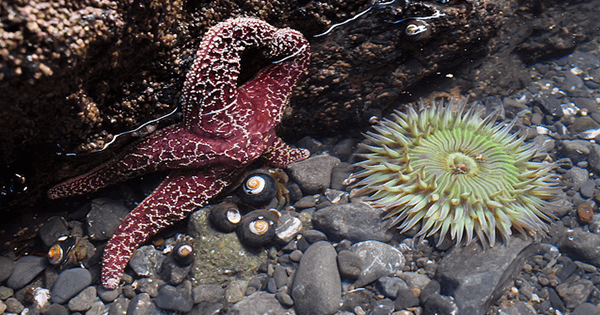
Extreme low tides are an occasion. Suddenly, the seafloor is available for view, for exploration, for gathering. Last Friday, we had a minus-five-foot tide, the first extreme low of the spring. My husband took off by boat with friends on a clam- and mussel-gathering expedition across the bay. My older daughter’s school planned a field trip to go tidepooling, and my younger daughter and I tagged along.
The school bus dropped us off about 50 feet away from where a 100-foot landing craft had been hauled ashore on a gravel berm above the beach. Farther down the beach, a rusty barge sat diagonally across the cobbles. It looked abandoned, but I suspect it was just waiting to be dragged ashore for repair. The tidepooling area was an inconspicuous muddy expanse beyond.
One other parent came on the adventure, and between the teachers, the aides, and us, we each traveled around the beach with our own clump of kids. My independent daughters, as usual, had run off to join another group, and so my clump was a group of four second-grade boys. When I asked them what our group name should be, one shouted “Dragons!” Another “Midnight!” So we became the Midnight Dragons, charging across the seafloor under a blaring morning sun.
As we marched down toward the edge of the retreating water, first the Midnight Dragons ranged over a zone where thousands of tiny worms stuck tubes out of the surface of the mud. I couldn’t remember what they were, but the Dragons didn’t care. “Check it out!” I called. “They’re moving.” The boys stopped for a moment and stared at the tips of the tubes, which nodded back and forth in the air. As we advanced down the beach, we entered an area so thick with anemones, you had to step carefully. Burrowing anemones splayed their tentacles just at the surface of the mud all around us. “Anemones!” one of the boys shouted. Then another and another. In turn, the Dragons knelt down and stuck their fingers into the tops of the squishy animals, which gripped them with sticky tentacles. Only Holden, a fair-haired boy with pale skin and boots that weren’t waterproof, wouldn’t touch the creatures. He had brought along an aquarium net and used it as his probe. With a wet, anemone-licked finger, Nikos—the tallest boy—reached over to touch Aidan’s brand-new cap. “Hey, don’t touch my hat,” Aidan said. “It’s special.”
“Star fish!” one of the Dragons shouted. Like a battle won, every discovery needed an announcement. And as we continued to the water’s edge, purple sea stars began to appear everywhere on the mud. The Dragons were fascinated by the big sea stars, the dime-sized ones, the ones in piles, the ones missing legs.
“Let’s put them back in the water,” Nikos ordered. There were hundreds of sea stars around us. I explained that, no, we needed to leave them here. They’d be covered by water in a matter of hours. Without a mission, Nikos was deflated.
Then we got into the region of good turning-over rocks, which revealed scores of mint-green sea urchins—some smaller than a pea—as well as shrimp, hermit crabs and decorator crabs (which cultivate seaweed on their backs), bright red marine worms, and two kinds of fish: sculpin and the eel-like gunnel. The Dragons were alternately transfixed and uninterested, wandering off to hit a metal piling with sticks they had found on the beach, making an impressive sound.
The highlight of the morning for me wasn’t particularly impressive to the Midnight Dragons: two opalescent nudibranchs in a shallow puddle. These are penny-sized sea slugs with outlandishly colored tentacles rising up from their backs, the sort of thing a burlesque dancer would fling around her neck if she were two inches tall. I called the boys over, but Holden and mission-ready Nikos had already set off back up the beach to take command of the paralyzed barge, and Aidan was climbing up rocks for better vantage. Leo came over and scooped one of the nudibranchs out of the water, needing to hold it, I imagine, to feel as though he’d really explored the thing. But without buoyancy, the mollusk turned into a pile of white mush in his palm. Once submerged, its tentacles feathered up in the water.
At the end of it all, the groups retreated up the beach for snacks before the bus picked us up. The water began to rush back over the flats, the territory the sea had given us for the morning. All the clumps of kids melted back together into a single small army, and the Dragons turned into boys again with granola bars in hand.

